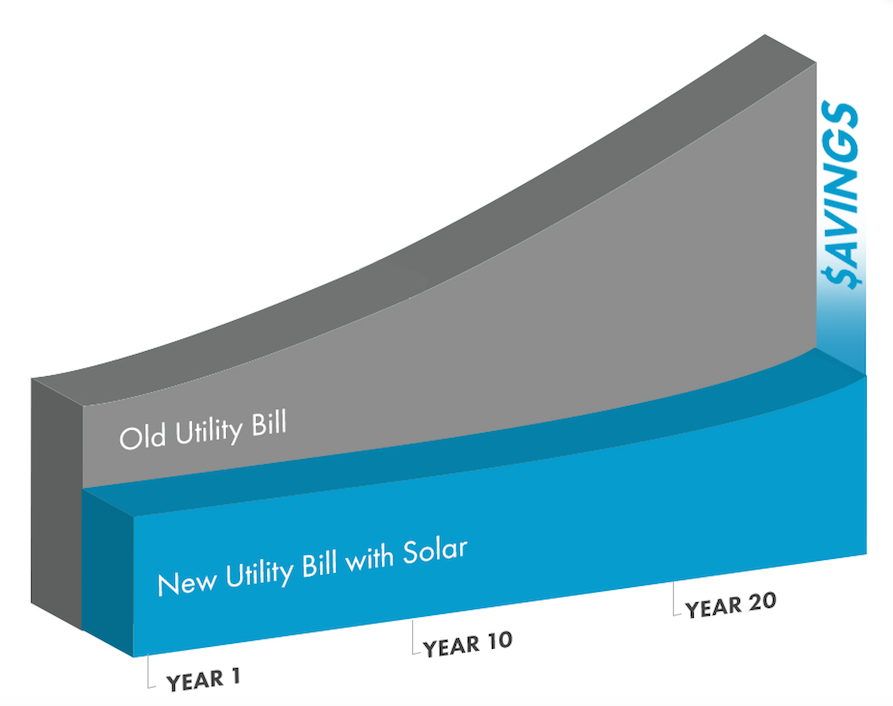6 Reasons You Should Buy Solar Panels
There is a lot of buzz around home solar these days. There are a lot of messages pushed to homeowners about their options. I’d like to focus on the most common question I receive, “Should I buy or lease?” I’m happy to say there are more options than simply buy or lease. Increasingly there are more choices to the customer’s advantage. The solar industry has been growing, and so have your financial options.
Buy Solar Panels (Purchasing Solar With Cash or Financing) VS. Lease Solar Panels
Previously, solar installers often pushed homeowners into solar leases. These leases were more advantageous for the solar installer. The installer owned the solar system and collect usage fees from the homeowner. Very few homeowners purchased their solar systems outright with cash.
Savvy financial institutions saw an opportunity to provide another option for homeowners, solar loans. These solar loans allowed homeowners to finance the purchase of their solar system with a short term, low APR loan. Homeowners could benefit from both short and long term savings with a solar loan. To learn more about solar loans, see this previous blog post outlining the basic types.
A small percentage of solar customers pay cash in full for their system today. Solar systems can cost tens of thousands of dollars to purchase outright. This purchase option is not possible for many families, however, for those which it is, it can provide significant savings.
Most people interested in buying solar panels choose to finance them. Financing your solar system provides you the benefit of ownership without the initial large cash outlay. You still own the system and can take advantage of the benefits therein.
6 Reasons The Decision to Buy Solar Panels Makes Sense
Everyone has to make a choice for themselves based on their home, family, and financial needs. However, there are six main reasons that homeowners end up purchasing (not leasing) their solar panels. Typically a combination of these factors plays a role in the final decision.
1) Reducing Monthly Electric Bill Costs
Most homeowners first take an interest in solar when their monthly bills spike. That could be due to air conditioning, a larger home, a new member of the household, etc. The desire to reduce monthly energy bills is the number one reason people cite for looking into solar.
If you choose to finance your solar system, there are variables to consider. Depending on the terms, length, APR, and other specifics of your loan, you may end up paying more each month into your solar investment. However, unlike paying a utility bill, these payments have an end date and are adding equity to your home.
2) Buying Solar Panels Increases Your Home’s Value
Whether you finance or cash purchase your solar system, you are adding equity to your home. You are in essence adding a power plant to the roof of your home. This solar panel system has a tangible value which is transferred upon the sale of your home.
Berkeley Labs completed a study looking into the value of homes with photovoltaics (PV). They studied “22,000 sales of homes, almost 4,000 of which contained PV systems in eight states from 1999 to 2013”. The value added to home equity was $4 a Watt. So the larger the solar system size, the greater the added value to the home. This Berkeley Labs study encompassed various regions, utilities, and home types.
3) Environmental Concerns
Going solar has a significant environmental impact. It is one of the most influential decisions a homeowner can make who is concerned with the environment.
The primary way going solar helps the environment is reducing the need for traditional dirty fuel sources. Coal, natural gas, and other traditional energy sources are ravaging the natural environment. Lessening the demand for these products protects and preserves land  otherwise disrupted. It also reduces the amount of CO2 released into the environment from procuring energy from these sources.
otherwise disrupted. It also reduces the amount of CO2 released into the environment from procuring energy from these sources.
Solar not only reduces your carbon footprint (CO2 output), it also reduces pollutants like mercury and acid rain deposited in your area by fossil fuel power plants. Community power plants have a direct correlation with air pollution, toxic water runoff, and ocean damage. The choice to buy solar panels contributes to a reduced need for these plants in your local community.
There is another major environmental impact of going solar that is overlooked – water use. Coal-fired power plants use up to 1,000 gallons of water to produce one MegaWatt hour (MWh) of electricity. Additionally, hydro-cooled power plants pull ocean water in, heat it to evaporation levels, and push it back into the local ecosystem at higher temperatures. Not only does this cause evaporation, but also algae blooms, loss of ocean life, and reshaping of the ocean landscape. In comparison, solar panels use no water to produce and an endless amount of energy.
The most important difference between traditional energy sources and solar photovoltaics is this: one is fuel, and one is technology. Fuel needs to be constantly replenished and fed into a generation mechanism. Photovoltaic panels are a technology in which you invest. The fuel source (sunshine) is free, clean, and plentiful!
4) Reducing Energy Dependence on Your Utility Provider
Another strong reason homeowners decide to buy solar panels is animosity towards your local utility. In many areas of the nation, there is no choice for electricity for your home. If you live in your home, you absolutely must use their service. This monopolizing of the energy market leads to price hikes, numerous fees levied, and unfair rate changes. Along with this comes the overloading of the power grid resulting in outages.
Some utilities also work in conjunction with lobbyists and legislators to ensure their position in the community energy market. This isolation of power can become dangerous for homeowners who have no say in the matter. Buying solar panels allows the homeowner to be in control of their energy production needs.
5) Expected Utility Cost Hikes
Utility companies can raise the cost of energy at their liberty. Restrictions on these changes vary by state and region. However, there are very few safeguards in place to prevent spike and increases in charges to homeowners.
Owning your power plant in the form of a solar system means you are exempt from many rate hikes, surcharges, and other unpredictable fees levied by utility companies. You can budget your energy costs into your long term home finances. Depending on the length and terms of your loan, you can recoup your ROI relatively quickly.
This cost predictability is a major advantage of owning a photovoltaic system. When your fuel is free (sunshine) and you own your solar system, you have more control.
6) Taking advantage of the Federal Solar Tax Credit (ITC)
Another reason homeowners flock to ownership is the Incentive Tax Credit (ITC). The federal solar tax credit is a federal initiative that is currently in place in all 50 states and only available to those who purchase or finance their solar system.
This tax credit calculates a percentage of the investment you made on your solar system and allows you to reduce your tax burden by that amount. 30% of your total gross system cost can be used as a tax credit. If you are unable to use that full amount the first year, the remainder may be rolled to the next fiscal year (up to 4 times or until used to completion).
For example, if your solar system cost $10,000, your federal solar tax credit would be $3,000. Say you are only able to apply $2,000 to your federal tax burden that year. The remaining $1,000 is still available to you the following year.
Most homeowners qualify for the federal solar tax credit. However, with all matters of finance, it is best to speak with your tax professional regarding eligibility and availability. Check this video to know more about Solar Tax Credit.
Going solar can be an overwhelming process. We, at Solar.com, are one of the best solar companies to help you navigate not only your financial options but any other questions you may have:
Check out this video to know how to claim your solar tax credit.
Our goal is to make going solar simple for homeowners. Schedule a call below with one of our solar advisors to have your questions answered, compare solar companies, see if solar is a good fit for you, or have any concerns or inquiries addressed.








